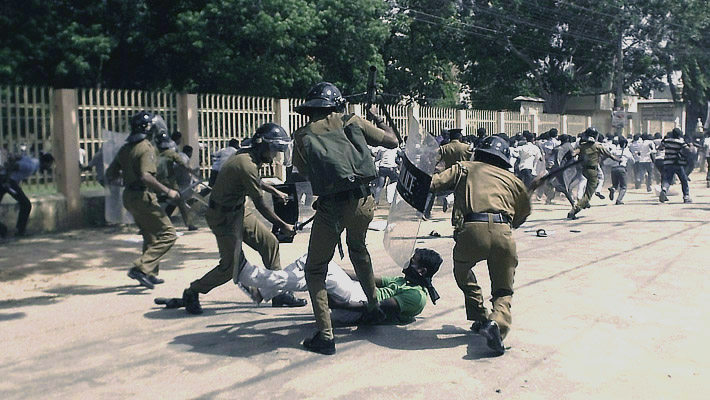 |
| Photo : Google search |
In the last
four years suppression of Sri Lankan students has been at its highest since the
1990s Marxist insurgency which left many students dead, according to a report
released this week by student and human rights groups.
The
government has used various methods at its disposal such as using the law and
law enforcement agencies to suppress students, attacking protests and
threatening and targeting student leaders, according to the 69-page report
State Suppression Against Students’ Movement of Sri Lanka, released by the
Inter University Students’ Federation, or IUSF, and Students for Human Rights.
It includes
details of suspension of student funding, banning student councils, suppressing
classes and other action such as law suits, arrests, assaults, threats,
assassinations and abductions involving students.
The report
covers incidents at 13 state universities from 2010 until early 2014.
IUSF said
its aim was to expose the “real nature of the current government” in violating
the human rights of students.
According
to statistics presented in the report, during the last four years suppression
of the student movement has increased to reach brutal levels.
IUSF
Convener Najith Indika said strong intervention from civil society
organisations, activists and people who value human rights and respect
democracy was needed to save the country’s higher education system from
repression.
The figures
According
to the report, in the last four years alone there were 1,420 expulsions and
suspensions of students from universities, 231 arrests and 426 lawsuits. Some
218 students, including student union leaders, faced death.
Three
students activists – Susantha Bandara, Janaka Ekanayake and Sisitha Priyankara
– were murdered during this time. In all three incidents the government
“managed to suppress the truth by false propaganda and delaying the proceedings
in the court”, the report claims.
In early 2012 a bomb blast that damaged the
symbolically significant Student Heroes Memorial at the university, dedicated
to students killed in previous uprisings, unleashed a wave of protest during
which more than 100 students were arrested.
During the past four years the Higher
Education Ministry has banned 36 student unions and councils allegedly for
'ragging' – maltreatment of freshers – according to the report. The government
wanted to ban the IUSF.
Tilvin Silva of the JVP, a Marxist party,
called on the government to stop student repression. He claimed thugs “led by
government politicians” had broken into universities to attack students. It “is
a serious situation”, he said.
A group of around 500 people armed with clubs
forcibly entered Ruhuna University on 2 June and attacked students for not
allowing an exhibition of the government’s national development plan to be held
on the university premises. Eight students were reportedly injured in the
attack.
Local and international human rights
organisations have expressed concern about violations.
Minister disputes figures
Commenting on the report, Sri Lanka’s Higher
Education Minister SB Dissanayake disputed the report. “The figures issued by
IUSF are wrong; there may be few class suspensions but not studentship
[scholarship] suspensions as mentioned here.
“The Higher Education Ministry is not
influencing universities regarding punishments. Universities have [their] own
set of procedures to handle it when students have done wrong.”
Universities conducted investigations and
punished students, Dissanayake stressed, and accused the IUSF – which has the
backing of the Marxist party – for being behind campus unrest.
Vice-chancellor held hostage
Last week around 300 students surrounded the
office of the vice-chancellor of Rajarata University, demanding that the
university lift its order to suspend several student leaders.
Students held the vice-vhancellor and several
lecturers hostage, and police in riot gear were called in to free the
university officials.
After a tense standoff as police beefed up
security near the campus, students finally allowed the vice-chancellor and
others to leave after holding them for almost 24 hours.
Police are still searching for 38 students
believed to be involved in the hostage-taking.
Later, the vice-chancellor closed down the
university. Student unions and councils have been banned from campus.
Commenting on the report, Brito Fernando,
president of Families of the Disappeared, or Fod, said abducting, assaulting
and illegally detaining students and ‘forged suspensions’ were a grave
violation of the fundamental rights of students.
“There were human rights violations during
the war. The war is over, now the pressure has moved to student movements. This
is a very critical thing – the government has launched a campaign of repression
against student activists fighting for education rights,” he said.
“If we let the government destroy student
unions and suppress their activities, it will be a disaster that will affect
other parties also,” Fernando said, adding because the student movement was
strong in Sri Lanka, how the government treated students could have a knock-on
effect on teachers, labourers, trade unions and other civil society groups.
Special
Thanks to Haritha at IUSF Media Unit and Ramidu at Law Faculty
© Original Article >>>>>>
www.universityworldnews.com
"Lanka University News"

No comments:
Post a Comment
Dear Readers,
Share Your Valuable Ideas with Others..
This is your forum. This is your voice..
But Please ....
Be Respectful of others. Debates may be Lively but taking part should be a positive experience for all participants.
Comments should be Pleasant, Useful, civil and tasteful, and must not be malicious or designed to offend.
Dont incite hatred on the basis of Education Background, Race, Religion, Gender, Nationality, Sexuality or other personal characteristic. Dont swear, use hate-speech or make obscene or Vulgar comments.
We encourage open, Lively debate but please be POLITE!
We wish you all a Prosperous & Fruitful Future!
-Admin - Lanka University News-